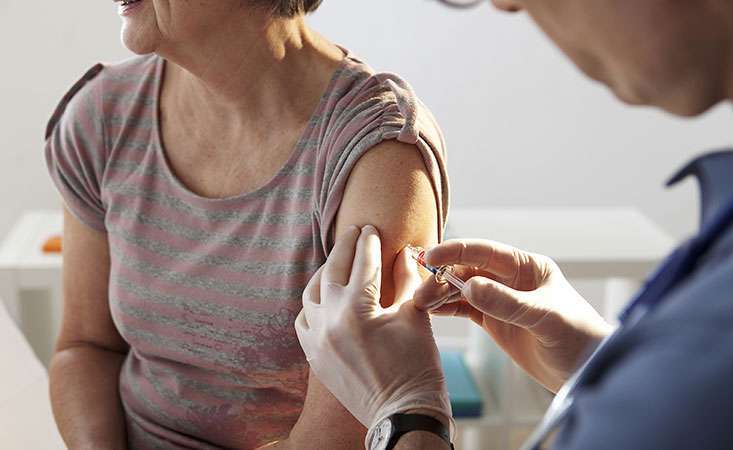
Editor’s note: In honor of World Immunization Week, we’re re-sharing this article on what pancreatic cancer patients and their families should know about vaccines. If you’re interested in the COVID-19 vaccine specifically, please see our blog on that topic.
Getting vaccinated isn’t just for kids.
Vaccines work with your body’s natural defenses to help lower your risk of infection and safely develop immunity to disease. They are an effective way to protect against serious illnesses, and several vaccines are recommended for adults.
But pancreatic cancer and its treatment can weaken your immune system, which brings up questions healthy individuals don’t have to ask: Are vaccines safe for pancreatic cancer patients? Are there specific vaccines patients should get because of their cancer? Is it safe and beneficial for caregivers and family members to get vaccinated?
“Vaccines are especially valuable to help prevent illness in people with pancreatic cancer, since their immune systems may be weakened,” says Anne-Marie Duliege, MD, chief medical officer at the Pancreatic Cancer Action Network (PanCAN).
“The complications resulting from these illnesses can be especially serious for patients, so it’s important to be proactive about keeping them healthy. However, there are factors the patient’s healthcare team will take into account when deciding how vaccines may be used.”
Here are five things for pancreatic cancer patients and their families to know about vaccines.
1. Talk to the patient’s oncologist when considering any vaccines.
Oncologists can help patients and their loved ones know what vaccines are safe and valuable for the patient as well as their caregivers and family members to get. This will help your whole family know what to consider.
2. Certain vaccines are recommended for those with weakened immune systems.
Serious illnesses like the flu, chickenpox, shingles and measles can cause even more drastic complications for pancreatic cancer patients. If patients and those who regularly come into close contact with them can get vaccinated against these diseases, it can help prevent the patient from getting the disease and suffering severe effects.
The Centers for Disease Control and Prevention (CDC) recommends patients with weakened immune systems talk to their doctor about these vaccines:
- Influenza (flu shot) every year
- Tdap
- Pneumococcal (both types)
You may also want to talk to your doctor about the shingles vaccine if you are over age 50, have had chickenpox or shingles in the past, and have not already received the vaccine.
3. Patients may not be able to get certain vaccines.
Some vaccines will not be given to cancer patients due to their compromised immune systems.
“Vaccines that contain live viruses are not recommended for cancer patients,” Duliege says. “However, there are some vaccines that don’t contain the live virus. And it is usually OK for caregivers and loved ones to get vaccines that contain the live virus.”
Doctors may also recommend patients avoid getting vaccines during chemotherapy or radiation therapy.
4. Caregivers and family members should consider getting vaccines.
Those in close, frequent contact with the patient can help keep them healthy by getting certain vaccines. “It is important for caregivers and family members to consider getting vaccines to help protect the patient, especially if the patient cannot get vaccinated,” Duliege advises.
Plus, it is important for caregivers to keep themselves healthy. While caregivers often find themselves neglecting their own health and self-care, if they are sick, they won’t be able to help their loved one.
5. Whether or not you can get vaccinated, be proactive about staying healthy.
Do your best to avoid getting sick and to make sure you’re communicating with the patient’s healthcare team when there may be an issue. Here are a few tips:
- Keep your distance from those who may be sick.
- Wash your hands frequently, including before meals and as soon as you return home from an outing. Request that work colleagues and guests to your home do the same.
- Consider wearing a surgical mask, as it may help reduce the patient’s chances of catching a disease like the flu or COVID-19.
- If the patient comes in contact with someone infected with a disease like COVID-19, measles, chickenpox or the flu, let the oncologist know immediately to see if there are precautionary measures they recommends taking.
















